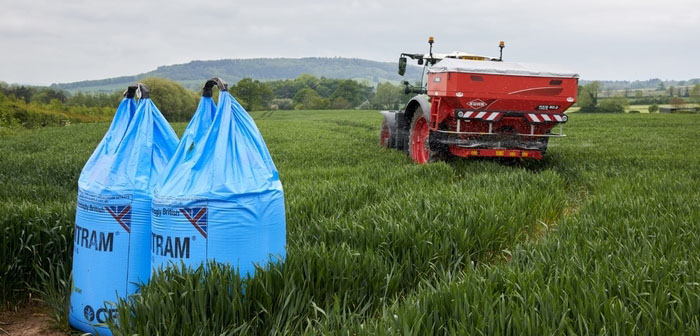A range of updates to CF Fertilisers’ Nitrogen management services is being introduced for 2021 to help growers use fertilisers as effectively as possible in light of new production and environmental challenges.
Improvements will include a new nationwide network of testers to make sampling simpler, the introduction of a ‘protein prediction’ test for milling wheat producers and greater online support for growers.
“Accurate and timely analysis of soil N content is becoming an increasingly important element of on-farm risk management planning as climatologists agree growers can expect more variable growing conditions in the future,” explains the company’s Ross Leadbeater.
“The UK Centre of Ecology and Hydrology has recently said that whilst 2020 was the worst production year of the last 25, the extreme conditions that caused it are likely to become more commonplace in the UK in the years ahead.
“Soil N content varies widely year on year depending on the weather and accurate analysis of this is a vital starting point in planning fertiliser applications accurately so N utilisation and cost efficiency of production are maximised and potential environmental impacts minimised.
“This is also of growing importance in light of the use of organic materials and manures now being used in arable production systems which throw another variable into the crop production mix.”
CF Fertilisers believe simple assays of Soil Mineral Nitrogen (SMN) are insufficient to provide the accuracy needed for future fertiliser planning so Total Soil Nitrogen Supply (SNS) will be the foundation of an updated N-Min service moving forward, he says.
“SNS takes into account N that will be mineralised and made available to plants as the season develops whereas SMN is just a snapshot of N in the soil at the time of the test.
“Without taking into account this extra soil N, growers risk applying too much fertiliser and in the modern world of responsible crop production and fertiliser use this is simply unacceptable.”
Improvement to the N-Min service for 2021 will come from a new nationwide network of samplers to make the process simpler. There will also be a ‘protein prediction’ test for milling wheat producers available from Hill Court Farm Research, he explains.
“We’re teaming up with UK agricultural and environmental research specialists Envirofield to provide a nationwide network of sampling technicians to plan soil sampling with farmers and agronomists, and carry out the necessary sampling as accurately as possible.
“We want to make the N-Min test as simple and widely accessible to as many people as possible so our new service takes the responsibility for sampling away from the grower’s agronomist, should they choose to, and puts it in the hands of specialists.
“Considering our trials over the last few years have shown increases in Margin over Purchased Fertilisers (MOPF) ranging from £60 to £280/ha from the improved fertiliser utilisation resulting from N-Min, it’s a highly cost-effective service.”
A development outside of the N-Min service, is a new ‘protein prediction’ test designed to allow growers of premium specification wheats to fine-tune their final fertiliser applications to maximise yields without sacrificing milling quality, Ross Leadbeater explains.
“Protein levels can be diluted as yields rise and this can be an issue with modern high yielding milling wheats.
“The new test identifies the amount of protein likely to be contained in grain at harvest so final N applications can be fine-tuned to meet quality and yield targets.”
Greater online support for arable producers on the latest thinking behind maximising fertiliser use efficiency can be found on the CF Fertilisers UK website at www.cffertilisers.co.uk




